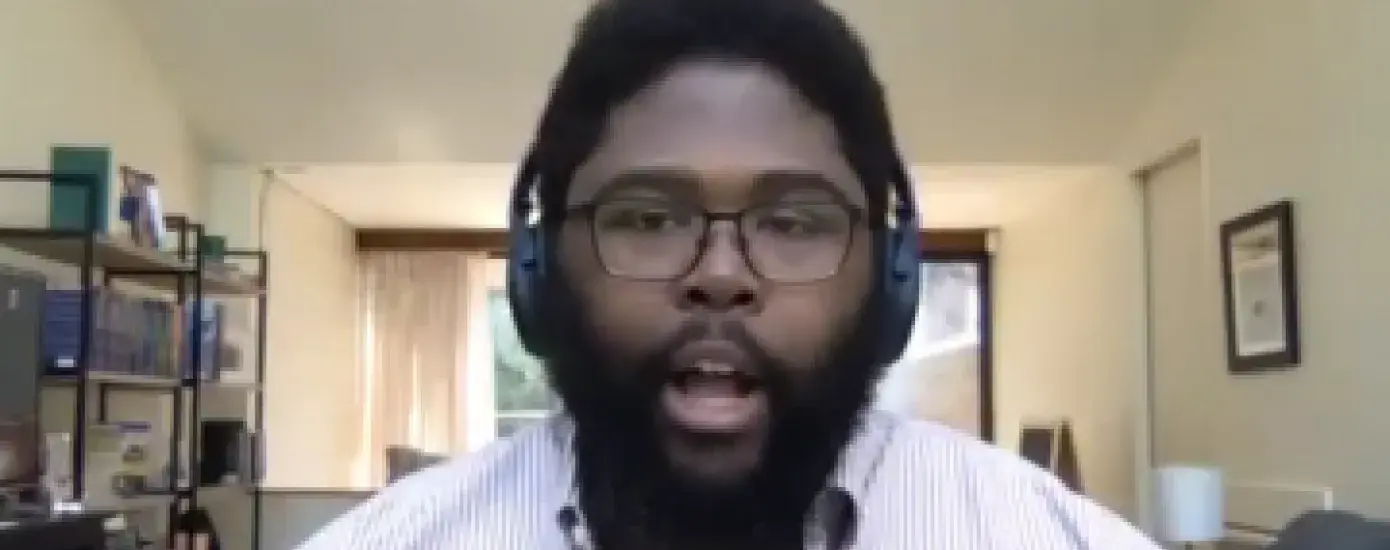
As millions of students have become distance learners due to the COVID-19 pandemic, Anthony A. Jack, PhD, warned that “graduate schools must respond to ensure inequity is not increased.
Dr. Jack, a junior fellow at the Harvard Society of Fellows and an assistant professor of education at the Harvard Graduate School of Education, spoke about the challenges students of color face during his June 23 virtual talk, “The Privileged Poor,” the MGH Institute of Health Professions Spring 2020 Baugh Visiting Faculty Scholar Lecture.
A sociologist of poverty and inequality, Dr. Jack is a nationally known author and speaker who focuses on the challenges first-generation and low-income college students face. His work is intersectional as it recounts some of the racialized experiences first-generation, low-income college students of color encounter.
“Social class determines how you move to and through college and if you make it there at all,” Jack told the virtual audience of more than 100 IHP community members, noting that just 14 percent of undergraduates at the country’s most competitive colleges and universities come from families in the bottom half of household income. “We must move to an equity-focused lens rather than an access-focused lens.”
He knows of this disparity all too well: he’s a Black man, a first-generation college student who graduated from Amherst College who was raised by a single mother in Miami who made less than $30,000. He knows what it’s like to rely on food stamps. He knows what it’s like to study in high school by candlelight because the electricity has been turned off. He knows how alienating it can be to remain on campus during Spring Break as affluent classmates take expensive vacations.
Jack, who holds the Shutzer Assistant Professorship at the Radcliffe Institute for Advanced Study at Harvard, said elite colleges are mobility springboards that mostly shut out the poor. His research confirmed that the overwhelming majority of Black students at elite colleges come from relatively privileged backgrounds – 38 colleges in America have more students from the top 1 percent of household income than the bottom 60 percent, despite many having adopted in recent decades no-loan financial aid policies for low-income students.
He spoke of the “hidden curriculum” that students who often experience culture shock must navigate to be successful, seemingly little things like clearly defining office hours or inviting the class to a faculty’s office. Graduate schools in particular, he said, should do such things like develop first-generation low-income student affinity groups, assess students’ basic needs including laptop and Internet access, incorporate and pay first-generation students to serve on committees, put students in contact with social services agencies and institutions, send multi-lingual and accessible material to families, and formalize mentoring relationships between current and incoming students.
As colleges nationwide sent students home this spring in response to the pandemic, the privileges enjoyed by wealthy students became more obvious. “What about students who don’t have a home to go back to? What about the unwanted, the students who know that home and harm are sometimes synonymous?” he asked. “In the wake of COVID, these are questions we need to ask ourselves. These closures and policies amplify class differences and serve as amplifiers of how different you are from the student the university wants you to be.”
The audience at the event, moderated by Kay Martinez, associate director in the Office of Diversity, Equity, and Inclusion, included E. Lorraine Baugh, the Honorary Trustee and the school’s first Board chair for whom the lecture is named. Established in 2012, the lecture series is made possible by the support of MGH Institute Honorary Trustee Carol M. Taylor, who was also in attendance, and her husband, John H. Deknatel.
More information about Dr. Jack’s research can be found in his book, The Privileged Poor: How Elite Colleges Are Failing Disadvantaged Students.
